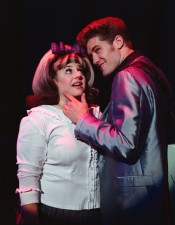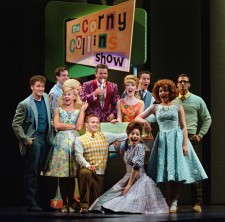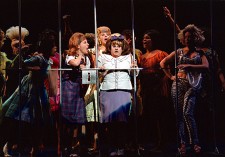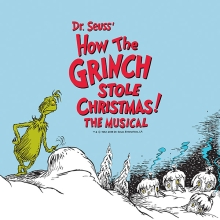Filichia Features: Calling All Tracy Turnblads
Filichia Features: Calling All Tracy Turnblads
Her name was Stella. She was a techie in the high school drama club for which I was an advisor. Between scenes of every show, you could see, if you looked carefully through the dimmed lights, Stella’s figure whisking around the stage.
Stella was faster than her fellow techies in picking up no-longer needed props, stuffing them into boxes, carting them off and reappearing in seconds to move furniture. She could throw a whirling dervish out of whirl – mostly because she loved being around theater.
One closing night yielded a late-night cast party in which kids took turns going to the piano and singing. Stella, for the first time, dared to take a turn. The pianist started the vamp to "Maybe This Time," and suddenly Stella began to sing -- beautifully. What's more, she felt every lyric. When she finished, the kids cheered, some from surprise, most out of admiration. So much for “What’s in a name?” “Stella” actually did mean “star.”
I was one of the first to approach her. "Stella," I said with a voice filled with admiration, "you have to try out for the spring musical."
She made a disgruntled face, gave a dismissive wave and then moved her hand up and down in front of her body with a look-at-me gesture. "And what part," she asked, "could I possibly play?"
Marissa Jaret Winokur (Tracy) and Matthew Morrison (Link) on Broadway in "I Can Hear The Bells"
Now she would, thanks to the excellent role of Tracy Turnblad in Hairspray.
Stella's now too old to play Tracy, but Maria Panvini isn't. In the recent production of Hairspray at The Road Company in Williamstown, New Jersey, the actress got to strut her considerable talent. And I’m so glad that Maria and all the 21st century Stellas of this world have a fine role to call their own.
Paula Farrar's set design offered three staircases interspersed with platforms. How wise for co-costume designer Denise Lallier, who collaborated with director Lauri Hudson, to put all the women (and Richard Butler’s Edna) in flats, sneakers, saddle shoes, mules and slippers. There was an occasional high-heel, but each was pretty low, so that when performers were asked to climb and descend these many stairs, sensible shoes avoided any staircase-long tumbles. Everyone zipped up and down the set without a break in the action or the ankles.
Now that we’ve covered shoes, let’s go to the other extreme and deal with hair-dos. The beehives here in Williamstown could accommodate hives of queens. If you’re producing Hairspray, you must not only flip your wigs off their wig stands and onto heads, but you must also have plenty of aerosol cans on hand to spray liberally. Try to get cans with ingredients that won’t choke your cast or the environment.
And while Stella was thinking of lead roles, actor Sean Casey would have given her a good argument for accepting a small part. Here Casey had the role of Corny Collins, the local TV show host, and, my, did he make the most of it. Casey captured the joy of a small-town emcee who believes that he possesses everything necessary for national network success. He was the adult who thought he was both young and cool – and couldn’t be more incorrect on both counts.
You've heard the expression "When life gives you lemons, make lemonade"? When auditions yield an inexperienced actor, cast him as the Ultra-Clutch Hairspray CEO Harriman F. Spritzer. Considering that he’s so scared stiff when he must make an appearance on Corny Collins’ show, here’s where a first-timer’s nervousness can be an asset. (Scott Angehr expertly played that here.)
As for Wilbur Turnblad, he believes that the most beautiful girl in the world isn’t Garbo, isn’t Dietrich or anyone else but Mrs. Wilbur Turnblad – well, in a tie with his daughter Tracy. Michael Hicks displayed the requisite unconditional love. So must your Wilbur.
Jodi Raditz gave everyone excellent choreography. Chances are the person entrusted to do this task for your production will have done many of these dances as a kid, so he or she will have a, uh, leg up on them. Hairspray is of the era in which the easiest-to-do of all dances was invented: the Twist. Use it.
The Road Company production moved with the speed of summer lightning, thanks to Lauri Hudson. The director must now have calluses an eighth of an inch thick on her thumb and middle finger; that must be the result of her constantly snapping her fingers during rehearsals, all to ensure that her cast stay sharp and proceed at a super-swift pace.
While Hudson followed the template of Jack O’Brien’s original staging, she did add a nice period touch to “The Big Dollhouse.” Among the incarcerated inmates, she included an actress dressed as a beatnik. Yeah, such an individual might have been brought in by some overzealous policeman.
As you audition, check for performers’ ability to throw basketballs across the stage – and catch them. It’s important in one scene. Once you cast, tell your performers to search their shelves and attics for dusty long-playing records and big-holed 45s. They'll be needed to decorate Maybelle's Record Shop.
For HAIRSPRAY returns us now to those silly days of yesteryear when those who used Brylcreem didn't believe that a little dab would do them, but that an entire tube was a daily requirement. Keep in mind, however, that it was also a time – and historically not all that long ago, sad to say -- when integration seemed an unlikely if not impossible dream. When Velma Von Tussle proclaims "Never in Baltimore," she believes it and means it. Hurrah to Tracy, the de facto political activist who wants peaceful coexistence for blacks and whites. In the process, Hairspray brings people together.
Of course, Tracy is also a typical 1962 teen who wants to dance the week away, get on TV and win the love of handsome Link Larkin. That she gets absolutely everything she wants may make Hairspray a fairy tale, but if there's any place for fairy tales, it's in musical comedy.
One last thing about Stella: Tracy is long beyond her years now, but I'm rooting for her to find a theater where she can play Edna. Yes, it's a role usually played by a man, and Richard Butler did well by it here. But haven't you heard of non-traditional casting?
Note: This article has recently been edited.

Read all of Filichia’s Features!
Visit Peter’s Official Website.
Check out Peter’s weekly column each Tuesday at www.masterworksbroadway.com and each Friday at www.kritzerland.com.
Peter’s newest book, Strippers, Shogirls, and Sharks: A Very Opinionated History of the Broadway Musicals That Did Not Win the Tony Award,is available for pre-order NOW!





























